SBLC5002: Business Ethics and its Impact on Managerial Effectiveness
VerifiedAdded on 2023/06/10
|19
|4951
|68
Report
AI Summary
This report explores the significance of business ethics in enhancing personal and managerial effectiveness within organizations. It emphasizes the importance of ethical conduct for long-term credibility, cost reduction, and customer satisfaction. The report reviews literature on business ethics, discussing its role in shaping organizational behavior and fostering trust among stakeholders. It also analyzes organizational examples and relevant theories, such as utilitarianism, to demonstrate how ethical practices contribute to sustainable success. The report further discusses the importance of ethical leadership, the establishment of ethics committees, and the implementation of clear ethical guidelines to mitigate conflicts of interest and promote a culture of integrity. The document concludes with recommendations for organizations to prioritize ethical conduct for overall effectiveness. Desklib provides a platform to access this and similar assignments.
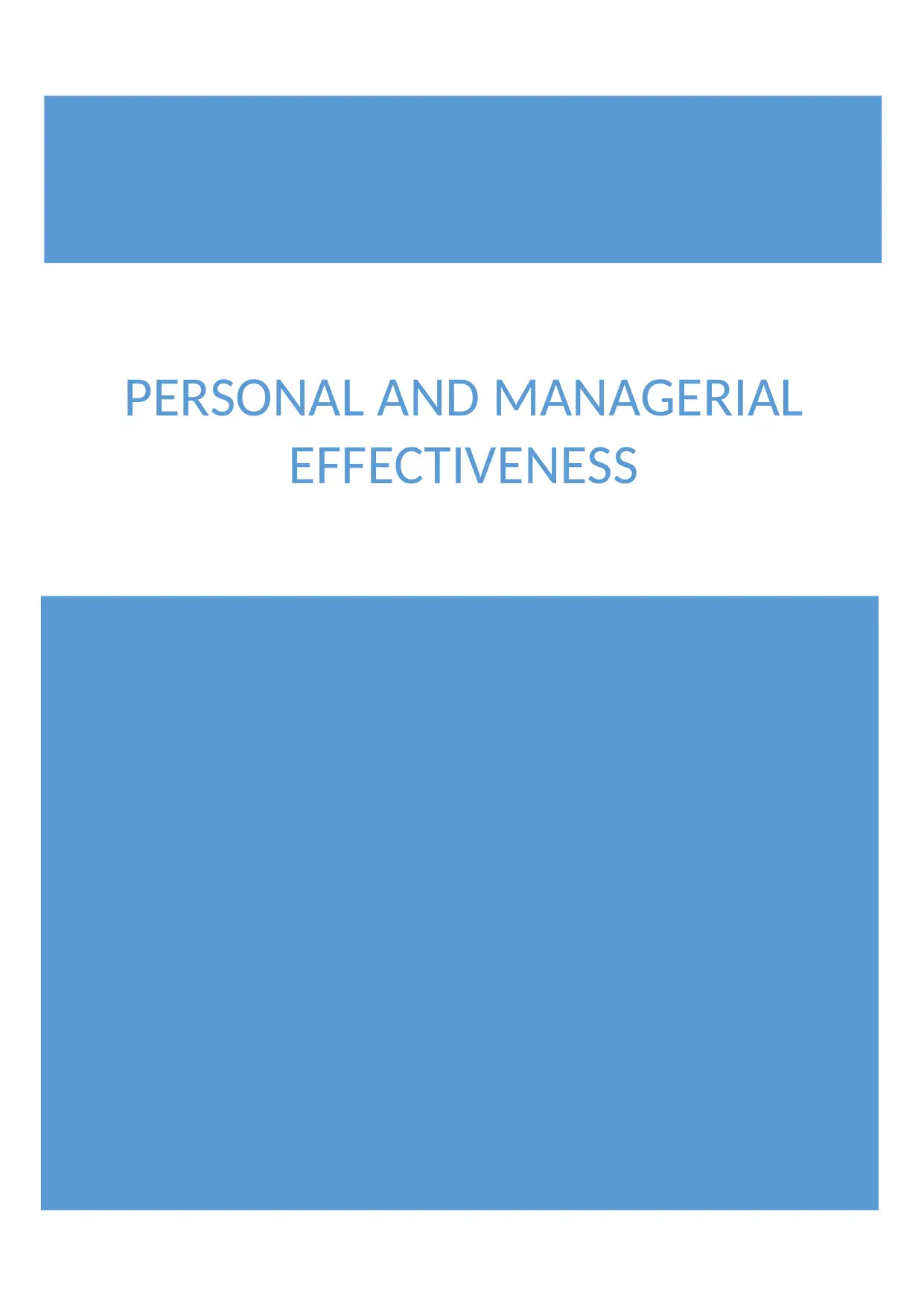
PERSONAL AND MANAGERIAL
EFFECTIVENESS
EFFECTIVENESS
Paraphrase This Document
Need a fresh take? Get an instant paraphrase of this document with our AI Paraphraser
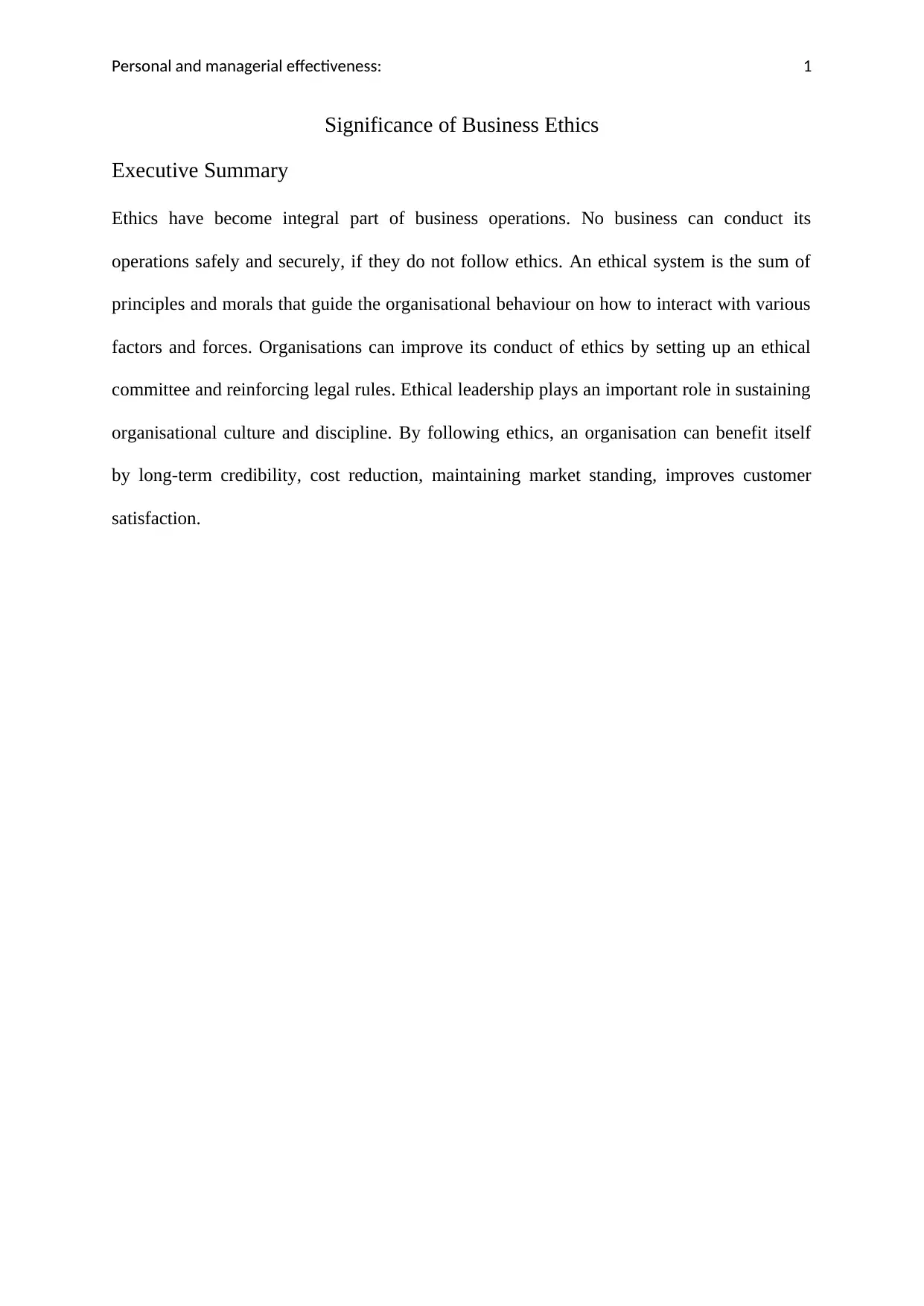
Personal and managerial effectiveness: 1
Significance of Business Ethics
Executive Summary
Ethics have become integral part of business operations. No business can conduct its
operations safely and securely, if they do not follow ethics. An ethical system is the sum of
principles and morals that guide the organisational behaviour on how to interact with various
factors and forces. Organisations can improve its conduct of ethics by setting up an ethical
committee and reinforcing legal rules. Ethical leadership plays an important role in sustaining
organisational culture and discipline. By following ethics, an organisation can benefit itself
by long-term credibility, cost reduction, maintaining market standing, improves customer
satisfaction.
Significance of Business Ethics
Executive Summary
Ethics have become integral part of business operations. No business can conduct its
operations safely and securely, if they do not follow ethics. An ethical system is the sum of
principles and morals that guide the organisational behaviour on how to interact with various
factors and forces. Organisations can improve its conduct of ethics by setting up an ethical
committee and reinforcing legal rules. Ethical leadership plays an important role in sustaining
organisational culture and discipline. By following ethics, an organisation can benefit itself
by long-term credibility, cost reduction, maintaining market standing, improves customer
satisfaction.
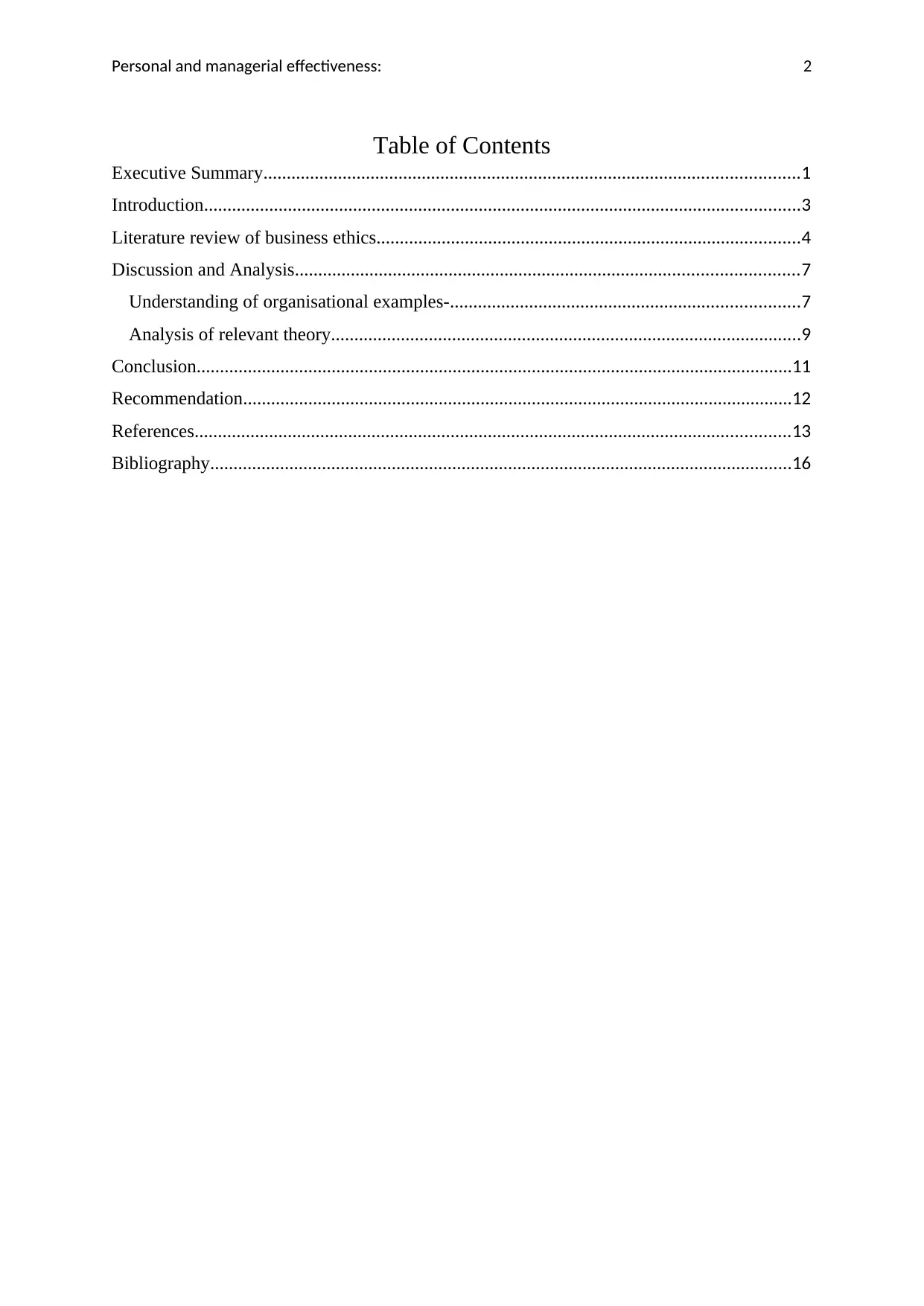
Personal and managerial effectiveness: 2
Table of Contents
Executive Summary...................................................................................................................1
Introduction................................................................................................................................3
Literature review of business ethics...........................................................................................4
Discussion and Analysis............................................................................................................7
Understanding of organisational examples-...........................................................................7
Analysis of relevant theory.....................................................................................................9
Conclusion................................................................................................................................11
Recommendation......................................................................................................................12
References................................................................................................................................13
Bibliography.............................................................................................................................16
Table of Contents
Executive Summary...................................................................................................................1
Introduction................................................................................................................................3
Literature review of business ethics...........................................................................................4
Discussion and Analysis............................................................................................................7
Understanding of organisational examples-...........................................................................7
Analysis of relevant theory.....................................................................................................9
Conclusion................................................................................................................................11
Recommendation......................................................................................................................12
References................................................................................................................................13
Bibliography.............................................................................................................................16
⊘ This is a preview!⊘
Do you want full access?
Subscribe today to unlock all pages.

Trusted by 1+ million students worldwide
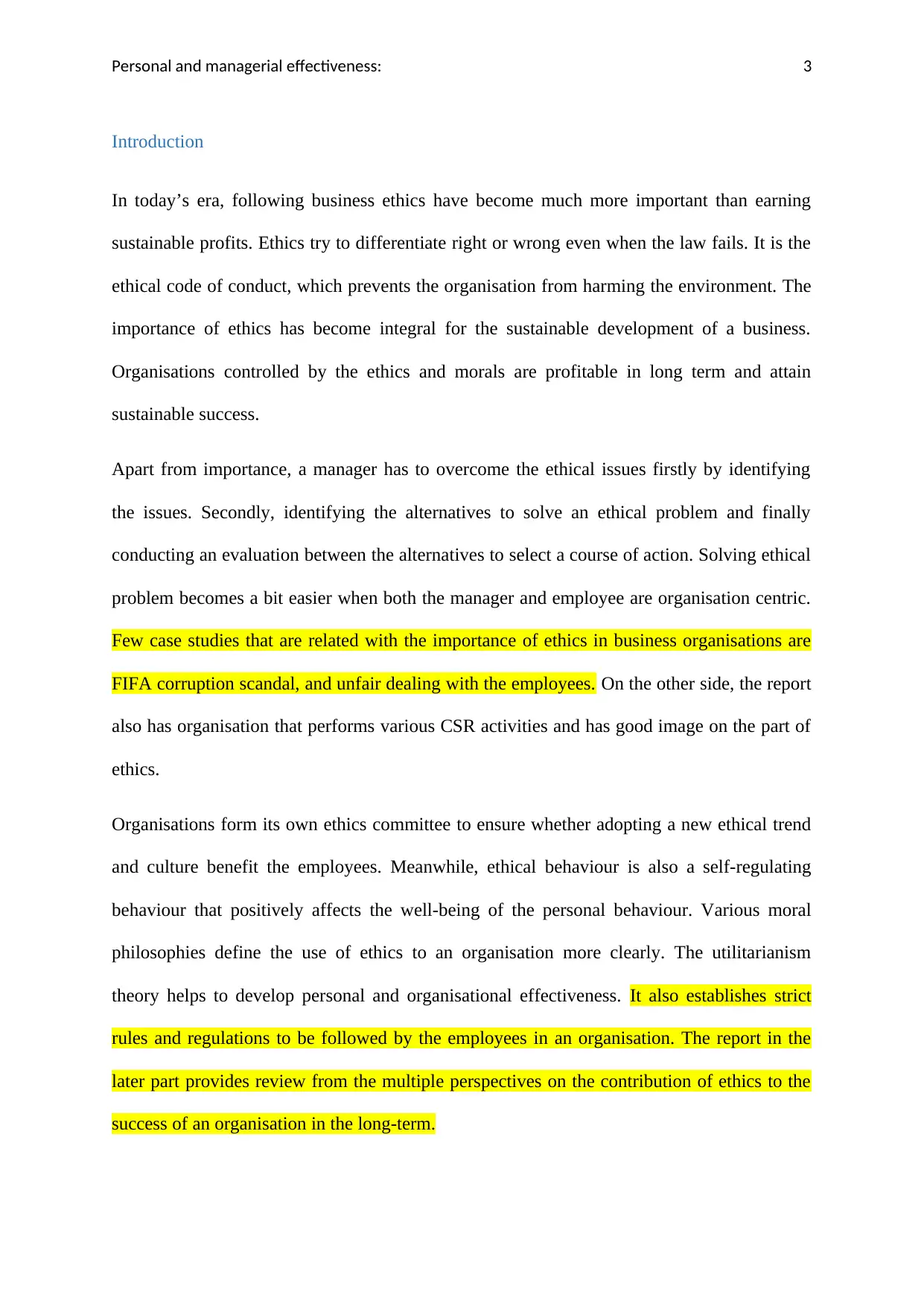
Personal and managerial effectiveness: 3
Introduction
In today’s era, following business ethics have become much more important than earning
sustainable profits. Ethics try to differentiate right or wrong even when the law fails. It is the
ethical code of conduct, which prevents the organisation from harming the environment. The
importance of ethics has become integral for the sustainable development of a business.
Organisations controlled by the ethics and morals are profitable in long term and attain
sustainable success.
Apart from importance, a manager has to overcome the ethical issues firstly by identifying
the issues. Secondly, identifying the alternatives to solve an ethical problem and finally
conducting an evaluation between the alternatives to select a course of action. Solving ethical
problem becomes a bit easier when both the manager and employee are organisation centric.
Few case studies that are related with the importance of ethics in business organisations are
FIFA corruption scandal, and unfair dealing with the employees. On the other side, the report
also has organisation that performs various CSR activities and has good image on the part of
ethics.
Organisations form its own ethics committee to ensure whether adopting a new ethical trend
and culture benefit the employees. Meanwhile, ethical behaviour is also a self-regulating
behaviour that positively affects the well-being of the personal behaviour. Various moral
philosophies define the use of ethics to an organisation more clearly. The utilitarianism
theory helps to develop personal and organisational effectiveness. It also establishes strict
rules and regulations to be followed by the employees in an organisation. The report in the
later part provides review from the multiple perspectives on the contribution of ethics to the
success of an organisation in the long-term.
Introduction
In today’s era, following business ethics have become much more important than earning
sustainable profits. Ethics try to differentiate right or wrong even when the law fails. It is the
ethical code of conduct, which prevents the organisation from harming the environment. The
importance of ethics has become integral for the sustainable development of a business.
Organisations controlled by the ethics and morals are profitable in long term and attain
sustainable success.
Apart from importance, a manager has to overcome the ethical issues firstly by identifying
the issues. Secondly, identifying the alternatives to solve an ethical problem and finally
conducting an evaluation between the alternatives to select a course of action. Solving ethical
problem becomes a bit easier when both the manager and employee are organisation centric.
Few case studies that are related with the importance of ethics in business organisations are
FIFA corruption scandal, and unfair dealing with the employees. On the other side, the report
also has organisation that performs various CSR activities and has good image on the part of
ethics.
Organisations form its own ethics committee to ensure whether adopting a new ethical trend
and culture benefit the employees. Meanwhile, ethical behaviour is also a self-regulating
behaviour that positively affects the well-being of the personal behaviour. Various moral
philosophies define the use of ethics to an organisation more clearly. The utilitarianism
theory helps to develop personal and organisational effectiveness. It also establishes strict
rules and regulations to be followed by the employees in an organisation. The report in the
later part provides review from the multiple perspectives on the contribution of ethics to the
success of an organisation in the long-term.
Paraphrase This Document
Need a fresh take? Get an instant paraphrase of this document with our AI Paraphraser
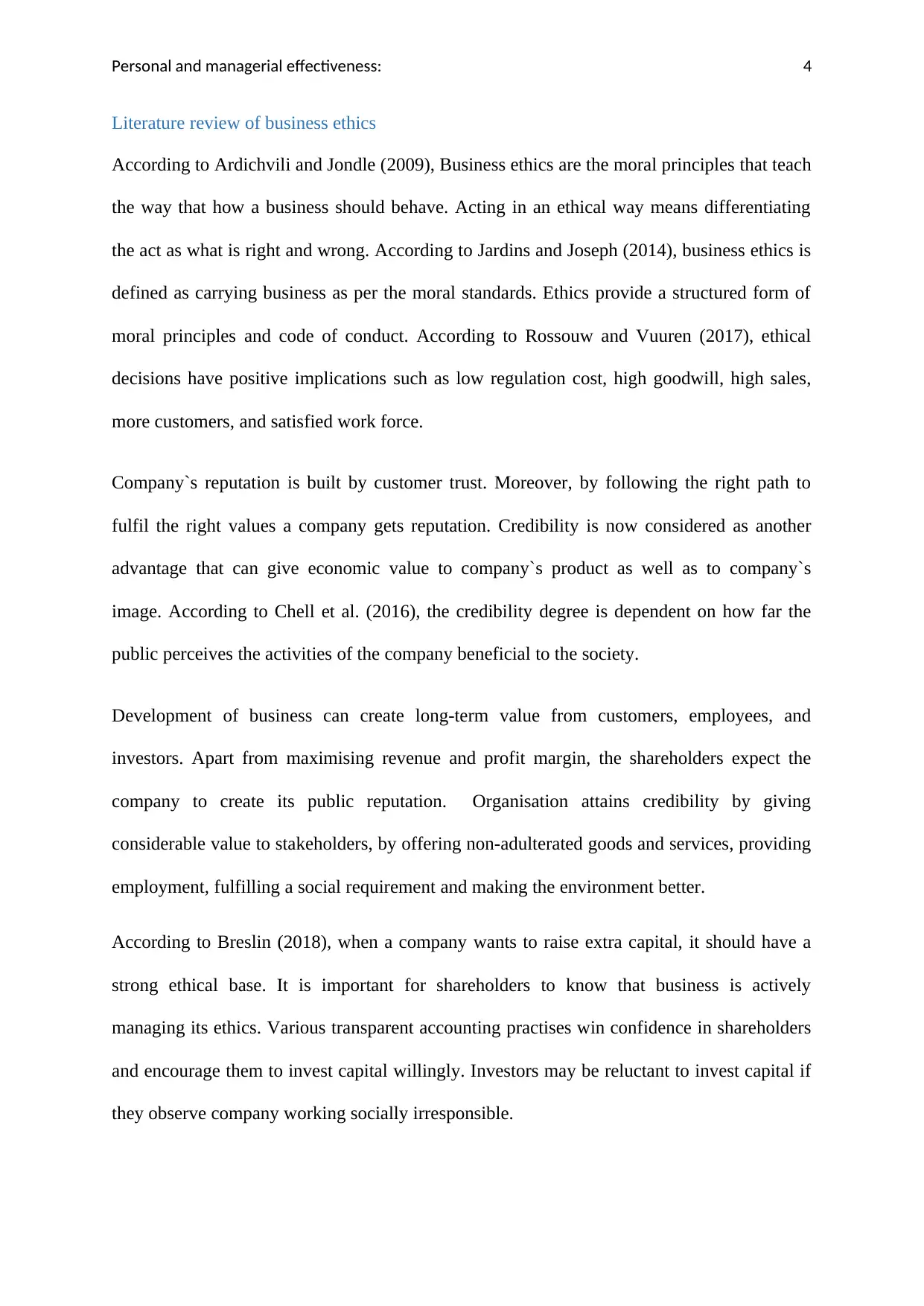
Personal and managerial effectiveness: 4
Literature review of business ethics
According to Ardichvili and Jondle (2009), Business ethics are the moral principles that teach
the way that how a business should behave. Acting in an ethical way means differentiating
the act as what is right and wrong. According to Jardins and Joseph (2014), business ethics is
defined as carrying business as per the moral standards. Ethics provide a structured form of
moral principles and code of conduct. According to Rossouw and Vuuren (2017), ethical
decisions have positive implications such as low regulation cost, high goodwill, high sales,
more customers, and satisfied work force.
Company`s reputation is built by customer trust. Moreover, by following the right path to
fulfil the right values a company gets reputation. Credibility is now considered as another
advantage that can give economic value to company`s product as well as to company`s
image. According to Chell et al. (2016), the credibility degree is dependent on how far the
public perceives the activities of the company beneficial to the society.
Development of business can create long-term value from customers, employees, and
investors. Apart from maximising revenue and profit margin, the shareholders expect the
company to create its public reputation. Organisation attains credibility by giving
considerable value to stakeholders, by offering non-adulterated goods and services, providing
employment, fulfilling a social requirement and making the environment better.
According to Breslin (2018), when a company wants to raise extra capital, it should have a
strong ethical base. It is important for shareholders to know that business is actively
managing its ethics. Various transparent accounting practises win confidence in shareholders
and encourage them to invest capital willingly. Investors may be reluctant to invest capital if
they observe company working socially irresponsible.
Literature review of business ethics
According to Ardichvili and Jondle (2009), Business ethics are the moral principles that teach
the way that how a business should behave. Acting in an ethical way means differentiating
the act as what is right and wrong. According to Jardins and Joseph (2014), business ethics is
defined as carrying business as per the moral standards. Ethics provide a structured form of
moral principles and code of conduct. According to Rossouw and Vuuren (2017), ethical
decisions have positive implications such as low regulation cost, high goodwill, high sales,
more customers, and satisfied work force.
Company`s reputation is built by customer trust. Moreover, by following the right path to
fulfil the right values a company gets reputation. Credibility is now considered as another
advantage that can give economic value to company`s product as well as to company`s
image. According to Chell et al. (2016), the credibility degree is dependent on how far the
public perceives the activities of the company beneficial to the society.
Development of business can create long-term value from customers, employees, and
investors. Apart from maximising revenue and profit margin, the shareholders expect the
company to create its public reputation. Organisation attains credibility by giving
considerable value to stakeholders, by offering non-adulterated goods and services, providing
employment, fulfilling a social requirement and making the environment better.
According to Breslin (2018), when a company wants to raise extra capital, it should have a
strong ethical base. It is important for shareholders to know that business is actively
managing its ethics. Various transparent accounting practises win confidence in shareholders
and encourage them to invest capital willingly. Investors may be reluctant to invest capital if
they observe company working socially irresponsible.
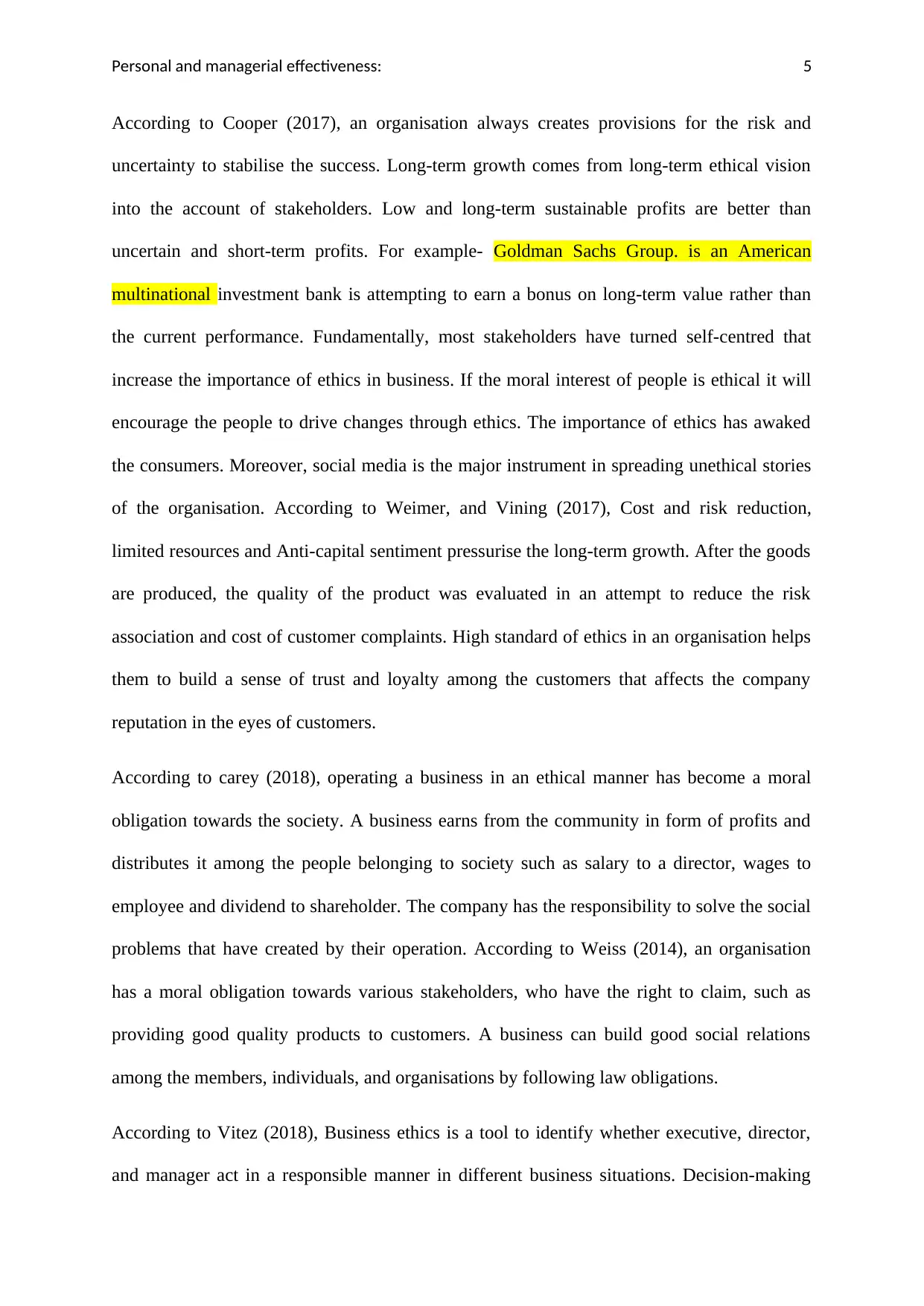
Personal and managerial effectiveness: 5
According to Cooper (2017), an organisation always creates provisions for the risk and
uncertainty to stabilise the success. Long-term growth comes from long-term ethical vision
into the account of stakeholders. Low and long-term sustainable profits are better than
uncertain and short-term profits. For example- Goldman Sachs Group. is an American
multinational investment bank is attempting to earn a bonus on long-term value rather than
the current performance. Fundamentally, most stakeholders have turned self-centred that
increase the importance of ethics in business. If the moral interest of people is ethical it will
encourage the people to drive changes through ethics. The importance of ethics has awaked
the consumers. Moreover, social media is the major instrument in spreading unethical stories
of the organisation. According to Weimer, and Vining (2017), Cost and risk reduction,
limited resources and Anti-capital sentiment pressurise the long-term growth. After the goods
are produced, the quality of the product was evaluated in an attempt to reduce the risk
association and cost of customer complaints. High standard of ethics in an organisation helps
them to build a sense of trust and loyalty among the customers that affects the company
reputation in the eyes of customers.
According to carey (2018), operating a business in an ethical manner has become a moral
obligation towards the society. A business earns from the community in form of profits and
distributes it among the people belonging to society such as salary to a director, wages to
employee and dividend to shareholder. The company has the responsibility to solve the social
problems that have created by their operation. According to Weiss (2014), an organisation
has a moral obligation towards various stakeholders, who have the right to claim, such as
providing good quality products to customers. A business can build good social relations
among the members, individuals, and organisations by following law obligations.
According to Vitez (2018), Business ethics is a tool to identify whether executive, director,
and manager act in a responsible manner in different business situations. Decision-making
According to Cooper (2017), an organisation always creates provisions for the risk and
uncertainty to stabilise the success. Long-term growth comes from long-term ethical vision
into the account of stakeholders. Low and long-term sustainable profits are better than
uncertain and short-term profits. For example- Goldman Sachs Group. is an American
multinational investment bank is attempting to earn a bonus on long-term value rather than
the current performance. Fundamentally, most stakeholders have turned self-centred that
increase the importance of ethics in business. If the moral interest of people is ethical it will
encourage the people to drive changes through ethics. The importance of ethics has awaked
the consumers. Moreover, social media is the major instrument in spreading unethical stories
of the organisation. According to Weimer, and Vining (2017), Cost and risk reduction,
limited resources and Anti-capital sentiment pressurise the long-term growth. After the goods
are produced, the quality of the product was evaluated in an attempt to reduce the risk
association and cost of customer complaints. High standard of ethics in an organisation helps
them to build a sense of trust and loyalty among the customers that affects the company
reputation in the eyes of customers.
According to carey (2018), operating a business in an ethical manner has become a moral
obligation towards the society. A business earns from the community in form of profits and
distributes it among the people belonging to society such as salary to a director, wages to
employee and dividend to shareholder. The company has the responsibility to solve the social
problems that have created by their operation. According to Weiss (2014), an organisation
has a moral obligation towards various stakeholders, who have the right to claim, such as
providing good quality products to customers. A business can build good social relations
among the members, individuals, and organisations by following law obligations.
According to Vitez (2018), Business ethics is a tool to identify whether executive, director,
and manager act in a responsible manner in different business situations. Decision-making
⊘ This is a preview!⊘
Do you want full access?
Subscribe today to unlock all pages.

Trusted by 1+ million students worldwide
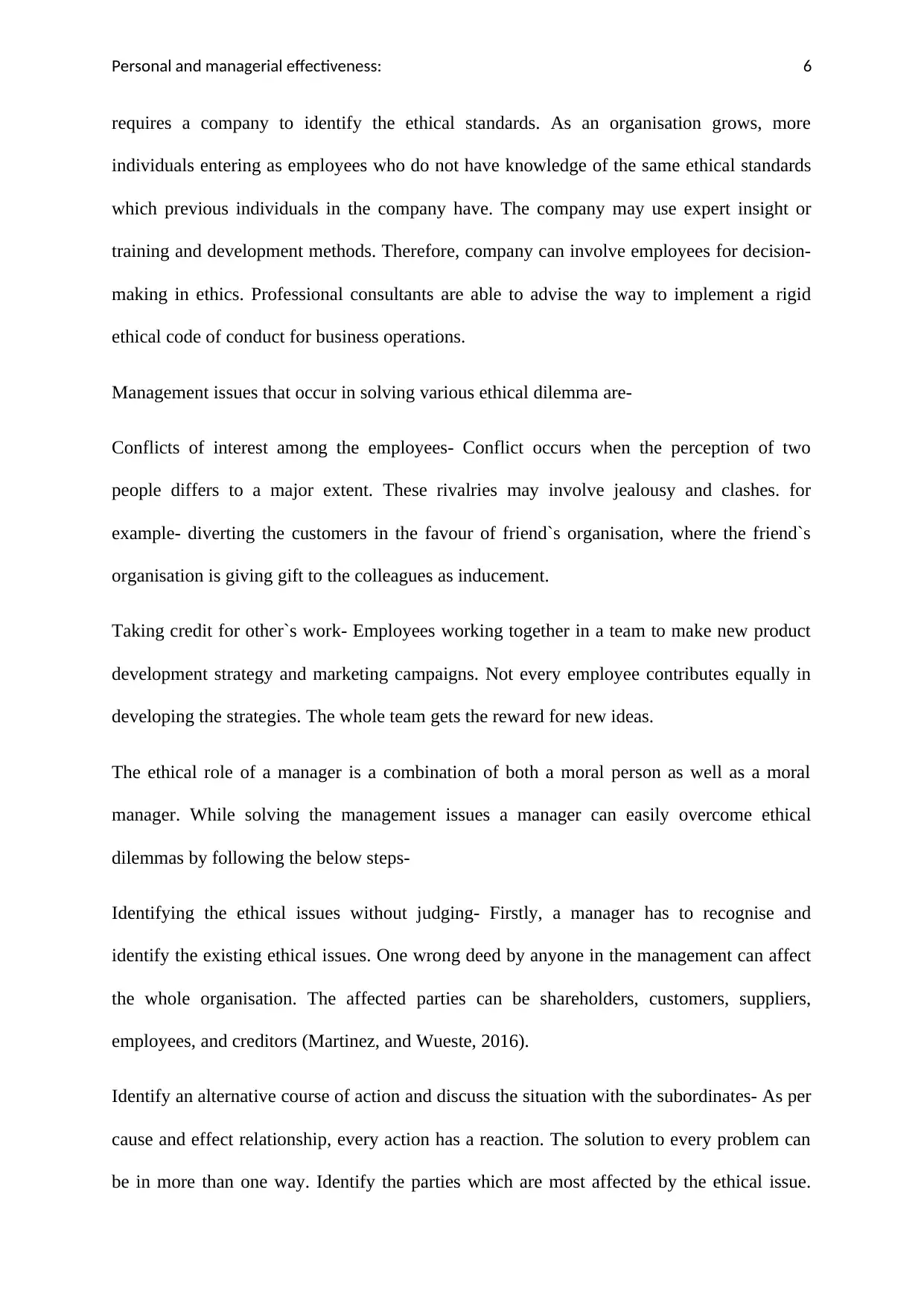
Personal and managerial effectiveness: 6
requires a company to identify the ethical standards. As an organisation grows, more
individuals entering as employees who do not have knowledge of the same ethical standards
which previous individuals in the company have. The company may use expert insight or
training and development methods. Therefore, company can involve employees for decision-
making in ethics. Professional consultants are able to advise the way to implement a rigid
ethical code of conduct for business operations.
Management issues that occur in solving various ethical dilemma are-
Conflicts of interest among the employees- Conflict occurs when the perception of two
people differs to a major extent. These rivalries may involve jealousy and clashes. for
example- diverting the customers in the favour of friend`s organisation, where the friend`s
organisation is giving gift to the colleagues as inducement.
Taking credit for other`s work- Employees working together in a team to make new product
development strategy and marketing campaigns. Not every employee contributes equally in
developing the strategies. The whole team gets the reward for new ideas.
The ethical role of a manager is a combination of both a moral person as well as a moral
manager. While solving the management issues a manager can easily overcome ethical
dilemmas by following the below steps-
Identifying the ethical issues without judging- Firstly, a manager has to recognise and
identify the existing ethical issues. One wrong deed by anyone in the management can affect
the whole organisation. The affected parties can be shareholders, customers, suppliers,
employees, and creditors (Martinez, and Wueste, 2016).
Identify an alternative course of action and discuss the situation with the subordinates- As per
cause and effect relationship, every action has a reaction. The solution to every problem can
be in more than one way. Identify the parties which are most affected by the ethical issue.
requires a company to identify the ethical standards. As an organisation grows, more
individuals entering as employees who do not have knowledge of the same ethical standards
which previous individuals in the company have. The company may use expert insight or
training and development methods. Therefore, company can involve employees for decision-
making in ethics. Professional consultants are able to advise the way to implement a rigid
ethical code of conduct for business operations.
Management issues that occur in solving various ethical dilemma are-
Conflicts of interest among the employees- Conflict occurs when the perception of two
people differs to a major extent. These rivalries may involve jealousy and clashes. for
example- diverting the customers in the favour of friend`s organisation, where the friend`s
organisation is giving gift to the colleagues as inducement.
Taking credit for other`s work- Employees working together in a team to make new product
development strategy and marketing campaigns. Not every employee contributes equally in
developing the strategies. The whole team gets the reward for new ideas.
The ethical role of a manager is a combination of both a moral person as well as a moral
manager. While solving the management issues a manager can easily overcome ethical
dilemmas by following the below steps-
Identifying the ethical issues without judging- Firstly, a manager has to recognise and
identify the existing ethical issues. One wrong deed by anyone in the management can affect
the whole organisation. The affected parties can be shareholders, customers, suppliers,
employees, and creditors (Martinez, and Wueste, 2016).
Identify an alternative course of action and discuss the situation with the subordinates- As per
cause and effect relationship, every action has a reaction. The solution to every problem can
be in more than one way. Identify the parties which are most affected by the ethical issue.
Paraphrase This Document
Need a fresh take? Get an instant paraphrase of this document with our AI Paraphraser
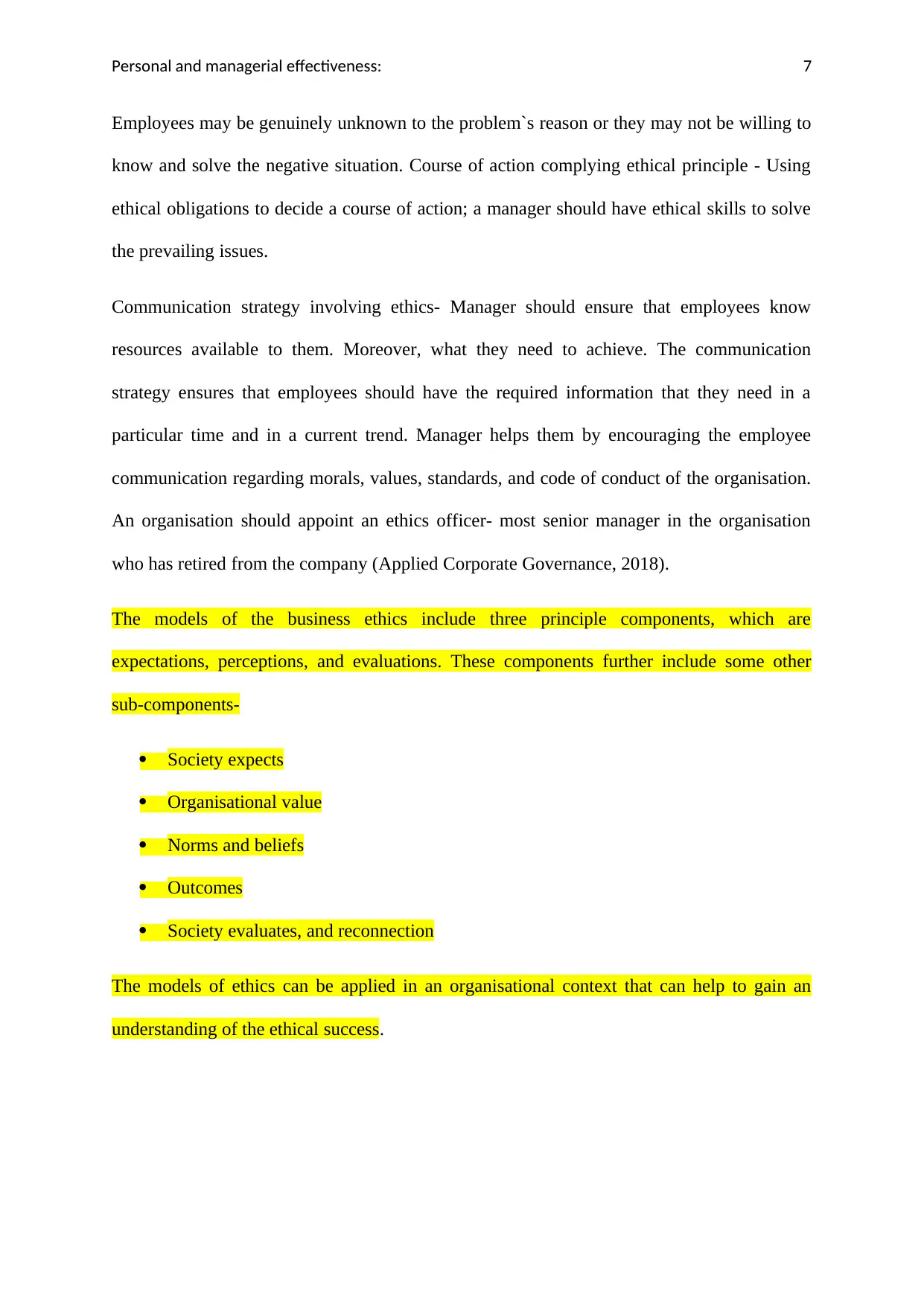
Personal and managerial effectiveness: 7
Employees may be genuinely unknown to the problem`s reason or they may not be willing to
know and solve the negative situation. Course of action complying ethical principle - Using
ethical obligations to decide a course of action; a manager should have ethical skills to solve
the prevailing issues.
Communication strategy involving ethics- Manager should ensure that employees know
resources available to them. Moreover, what they need to achieve. The communication
strategy ensures that employees should have the required information that they need in a
particular time and in a current trend. Manager helps them by encouraging the employee
communication regarding morals, values, standards, and code of conduct of the organisation.
An organisation should appoint an ethics officer- most senior manager in the organisation
who has retired from the company (Applied Corporate Governance, 2018).
The models of the business ethics include three principle components, which are
expectations, perceptions, and evaluations. These components further include some other
sub-components-
Society expects
Organisational value
Norms and beliefs
Outcomes
Society evaluates, and reconnection
The models of ethics can be applied in an organisational context that can help to gain an
understanding of the ethical success.
Employees may be genuinely unknown to the problem`s reason or they may not be willing to
know and solve the negative situation. Course of action complying ethical principle - Using
ethical obligations to decide a course of action; a manager should have ethical skills to solve
the prevailing issues.
Communication strategy involving ethics- Manager should ensure that employees know
resources available to them. Moreover, what they need to achieve. The communication
strategy ensures that employees should have the required information that they need in a
particular time and in a current trend. Manager helps them by encouraging the employee
communication regarding morals, values, standards, and code of conduct of the organisation.
An organisation should appoint an ethics officer- most senior manager in the organisation
who has retired from the company (Applied Corporate Governance, 2018).
The models of the business ethics include three principle components, which are
expectations, perceptions, and evaluations. These components further include some other
sub-components-
Society expects
Organisational value
Norms and beliefs
Outcomes
Society evaluates, and reconnection
The models of ethics can be applied in an organisational context that can help to gain an
understanding of the ethical success.
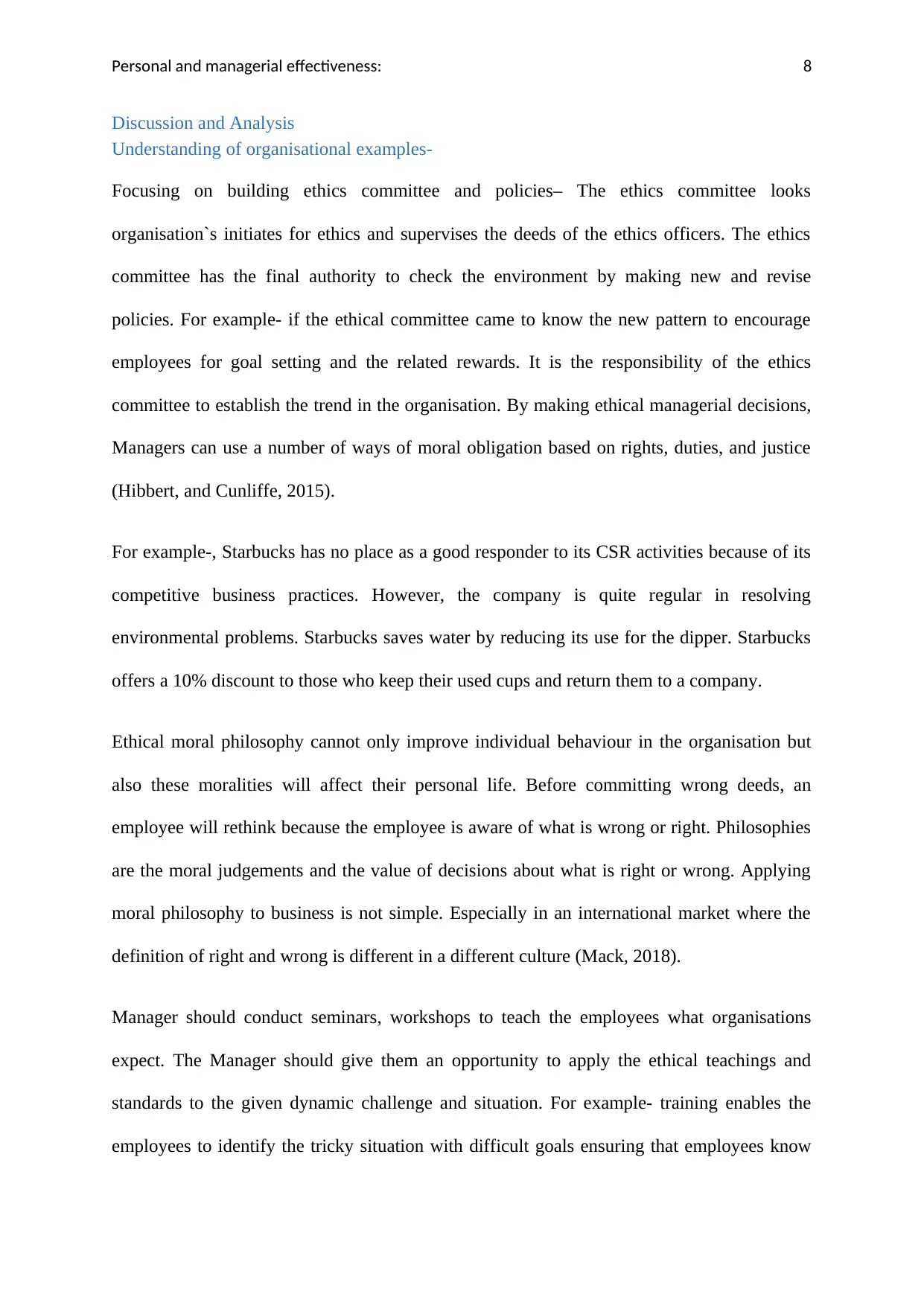
Personal and managerial effectiveness: 8
Discussion and Analysis
Understanding of organisational examples-
Focusing on building ethics committee and policies– The ethics committee looks
organisation`s initiates for ethics and supervises the deeds of the ethics officers. The ethics
committee has the final authority to check the environment by making new and revise
policies. For example- if the ethical committee came to know the new pattern to encourage
employees for goal setting and the related rewards. It is the responsibility of the ethics
committee to establish the trend in the organisation. By making ethical managerial decisions,
Managers can use a number of ways of moral obligation based on rights, duties, and justice
(Hibbert, and Cunliffe, 2015).
For example-, Starbucks has no place as a good responder to its CSR activities because of its
competitive business practices. However, the company is quite regular in resolving
environmental problems. Starbucks saves water by reducing its use for the dipper. Starbucks
offers a 10% discount to those who keep their used cups and return them to a company.
Ethical moral philosophy cannot only improve individual behaviour in the organisation but
also these moralities will affect their personal life. Before committing wrong deeds, an
employee will rethink because the employee is aware of what is wrong or right. Philosophies
are the moral judgements and the value of decisions about what is right or wrong. Applying
moral philosophy to business is not simple. Especially in an international market where the
definition of right and wrong is different in a different culture (Mack, 2018).
Manager should conduct seminars, workshops to teach the employees what organisations
expect. The Manager should give them an opportunity to apply the ethical teachings and
standards to the given dynamic challenge and situation. For example- training enables the
employees to identify the tricky situation with difficult goals ensuring that employees know
Discussion and Analysis
Understanding of organisational examples-
Focusing on building ethics committee and policies– The ethics committee looks
organisation`s initiates for ethics and supervises the deeds of the ethics officers. The ethics
committee has the final authority to check the environment by making new and revise
policies. For example- if the ethical committee came to know the new pattern to encourage
employees for goal setting and the related rewards. It is the responsibility of the ethics
committee to establish the trend in the organisation. By making ethical managerial decisions,
Managers can use a number of ways of moral obligation based on rights, duties, and justice
(Hibbert, and Cunliffe, 2015).
For example-, Starbucks has no place as a good responder to its CSR activities because of its
competitive business practices. However, the company is quite regular in resolving
environmental problems. Starbucks saves water by reducing its use for the dipper. Starbucks
offers a 10% discount to those who keep their used cups and return them to a company.
Ethical moral philosophy cannot only improve individual behaviour in the organisation but
also these moralities will affect their personal life. Before committing wrong deeds, an
employee will rethink because the employee is aware of what is wrong or right. Philosophies
are the moral judgements and the value of decisions about what is right or wrong. Applying
moral philosophy to business is not simple. Especially in an international market where the
definition of right and wrong is different in a different culture (Mack, 2018).
Manager should conduct seminars, workshops to teach the employees what organisations
expect. The Manager should give them an opportunity to apply the ethical teachings and
standards to the given dynamic challenge and situation. For example- training enables the
employees to identify the tricky situation with difficult goals ensuring that employees know
⊘ This is a preview!⊘
Do you want full access?
Subscribe today to unlock all pages.

Trusted by 1+ million students worldwide
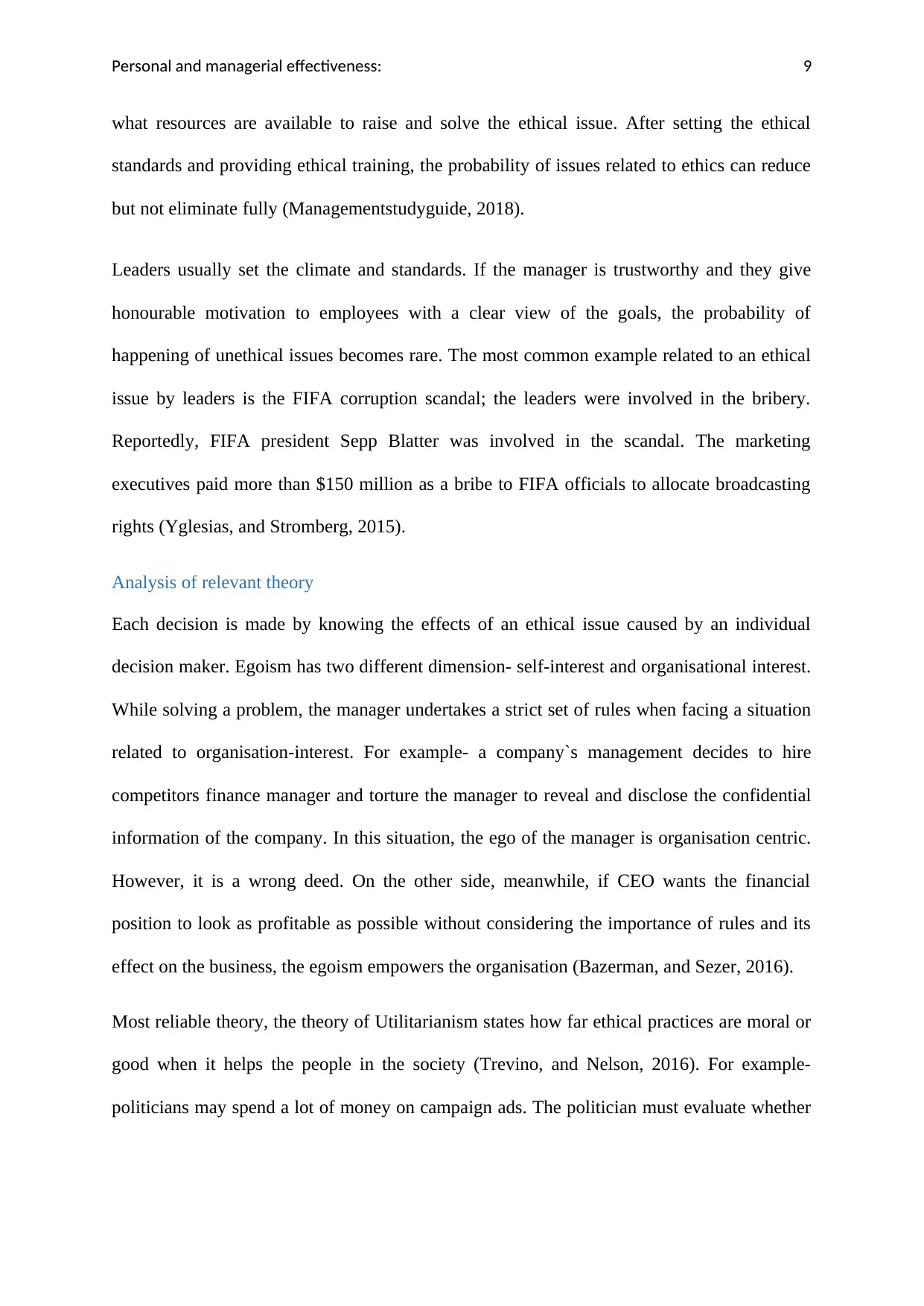
Personal and managerial effectiveness: 9
what resources are available to raise and solve the ethical issue. After setting the ethical
standards and providing ethical training, the probability of issues related to ethics can reduce
but not eliminate fully (Managementstudyguide, 2018).
Leaders usually set the climate and standards. If the manager is trustworthy and they give
honourable motivation to employees with a clear view of the goals, the probability of
happening of unethical issues becomes rare. The most common example related to an ethical
issue by leaders is the FIFA corruption scandal; the leaders were involved in the bribery.
Reportedly, FIFA president Sepp Blatter was involved in the scandal. The marketing
executives paid more than $150 million as a bribe to FIFA officials to allocate broadcasting
rights (Yglesias, and Stromberg, 2015).
Analysis of relevant theory
Each decision is made by knowing the effects of an ethical issue caused by an individual
decision maker. Egoism has two different dimension- self-interest and organisational interest.
While solving a problem, the manager undertakes a strict set of rules when facing a situation
related to organisation-interest. For example- a company`s management decides to hire
competitors finance manager and torture the manager to reveal and disclose the confidential
information of the company. In this situation, the ego of the manager is organisation centric.
However, it is a wrong deed. On the other side, meanwhile, if CEO wants the financial
position to look as profitable as possible without considering the importance of rules and its
effect on the business, the egoism empowers the organisation (Bazerman, and Sezer, 2016).
Most reliable theory, the theory of Utilitarianism states how far ethical practices are moral or
good when it helps the people in the society (Trevino, and Nelson, 2016). For example-
politicians may spend a lot of money on campaign ads. The politician must evaluate whether
what resources are available to raise and solve the ethical issue. After setting the ethical
standards and providing ethical training, the probability of issues related to ethics can reduce
but not eliminate fully (Managementstudyguide, 2018).
Leaders usually set the climate and standards. If the manager is trustworthy and they give
honourable motivation to employees with a clear view of the goals, the probability of
happening of unethical issues becomes rare. The most common example related to an ethical
issue by leaders is the FIFA corruption scandal; the leaders were involved in the bribery.
Reportedly, FIFA president Sepp Blatter was involved in the scandal. The marketing
executives paid more than $150 million as a bribe to FIFA officials to allocate broadcasting
rights (Yglesias, and Stromberg, 2015).
Analysis of relevant theory
Each decision is made by knowing the effects of an ethical issue caused by an individual
decision maker. Egoism has two different dimension- self-interest and organisational interest.
While solving a problem, the manager undertakes a strict set of rules when facing a situation
related to organisation-interest. For example- a company`s management decides to hire
competitors finance manager and torture the manager to reveal and disclose the confidential
information of the company. In this situation, the ego of the manager is organisation centric.
However, it is a wrong deed. On the other side, meanwhile, if CEO wants the financial
position to look as profitable as possible without considering the importance of rules and its
effect on the business, the egoism empowers the organisation (Bazerman, and Sezer, 2016).
Most reliable theory, the theory of Utilitarianism states how far ethical practices are moral or
good when it helps the people in the society (Trevino, and Nelson, 2016). For example-
politicians may spend a lot of money on campaign ads. The politician must evaluate whether
Paraphrase This Document
Need a fresh take? Get an instant paraphrase of this document with our AI Paraphraser
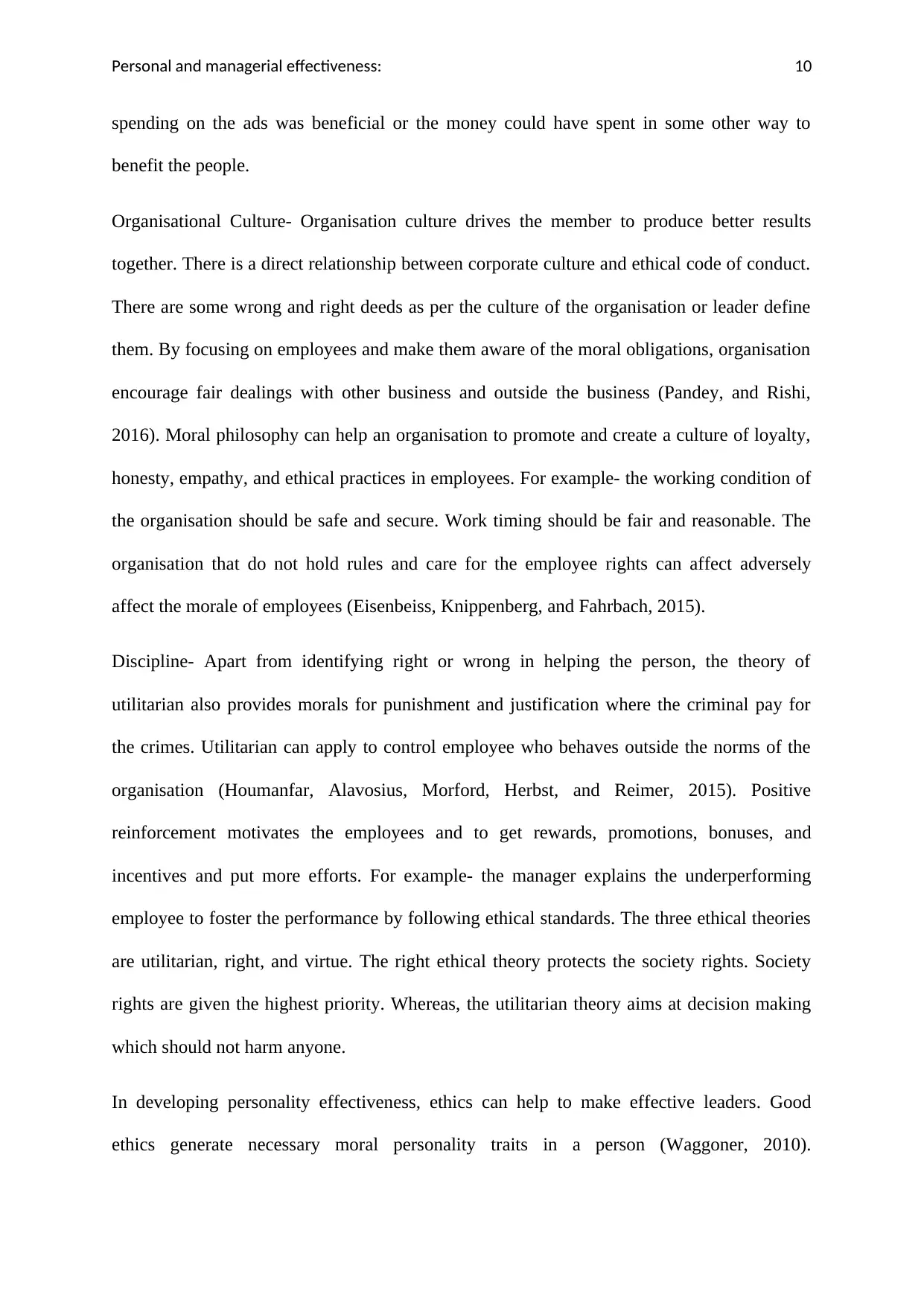
Personal and managerial effectiveness: 10
spending on the ads was beneficial or the money could have spent in some other way to
benefit the people.
Organisational Culture- Organisation culture drives the member to produce better results
together. There is a direct relationship between corporate culture and ethical code of conduct.
There are some wrong and right deeds as per the culture of the organisation or leader define
them. By focusing on employees and make them aware of the moral obligations, organisation
encourage fair dealings with other business and outside the business (Pandey, and Rishi,
2016). Moral philosophy can help an organisation to promote and create a culture of loyalty,
honesty, empathy, and ethical practices in employees. For example- the working condition of
the organisation should be safe and secure. Work timing should be fair and reasonable. The
organisation that do not hold rules and care for the employee rights can affect adversely
affect the morale of employees (Eisenbeiss, Knippenberg, and Fahrbach, 2015).
Discipline- Apart from identifying right or wrong in helping the person, the theory of
utilitarian also provides morals for punishment and justification where the criminal pay for
the crimes. Utilitarian can apply to control employee who behaves outside the norms of the
organisation (Houmanfar, Alavosius, Morford, Herbst, and Reimer, 2015). Positive
reinforcement motivates the employees and to get rewards, promotions, bonuses, and
incentives and put more efforts. For example- the manager explains the underperforming
employee to foster the performance by following ethical standards. The three ethical theories
are utilitarian, right, and virtue. The right ethical theory protects the society rights. Society
rights are given the highest priority. Whereas, the utilitarian theory aims at decision making
which should not harm anyone.
In developing personality effectiveness, ethics can help to make effective leaders. Good
ethics generate necessary moral personality traits in a person (Waggoner, 2010).
spending on the ads was beneficial or the money could have spent in some other way to
benefit the people.
Organisational Culture- Organisation culture drives the member to produce better results
together. There is a direct relationship between corporate culture and ethical code of conduct.
There are some wrong and right deeds as per the culture of the organisation or leader define
them. By focusing on employees and make them aware of the moral obligations, organisation
encourage fair dealings with other business and outside the business (Pandey, and Rishi,
2016). Moral philosophy can help an organisation to promote and create a culture of loyalty,
honesty, empathy, and ethical practices in employees. For example- the working condition of
the organisation should be safe and secure. Work timing should be fair and reasonable. The
organisation that do not hold rules and care for the employee rights can affect adversely
affect the morale of employees (Eisenbeiss, Knippenberg, and Fahrbach, 2015).
Discipline- Apart from identifying right or wrong in helping the person, the theory of
utilitarian also provides morals for punishment and justification where the criminal pay for
the crimes. Utilitarian can apply to control employee who behaves outside the norms of the
organisation (Houmanfar, Alavosius, Morford, Herbst, and Reimer, 2015). Positive
reinforcement motivates the employees and to get rewards, promotions, bonuses, and
incentives and put more efforts. For example- the manager explains the underperforming
employee to foster the performance by following ethical standards. The three ethical theories
are utilitarian, right, and virtue. The right ethical theory protects the society rights. Society
rights are given the highest priority. Whereas, the utilitarian theory aims at decision making
which should not harm anyone.
In developing personality effectiveness, ethics can help to make effective leaders. Good
ethics generate necessary moral personality traits in a person (Waggoner, 2010).
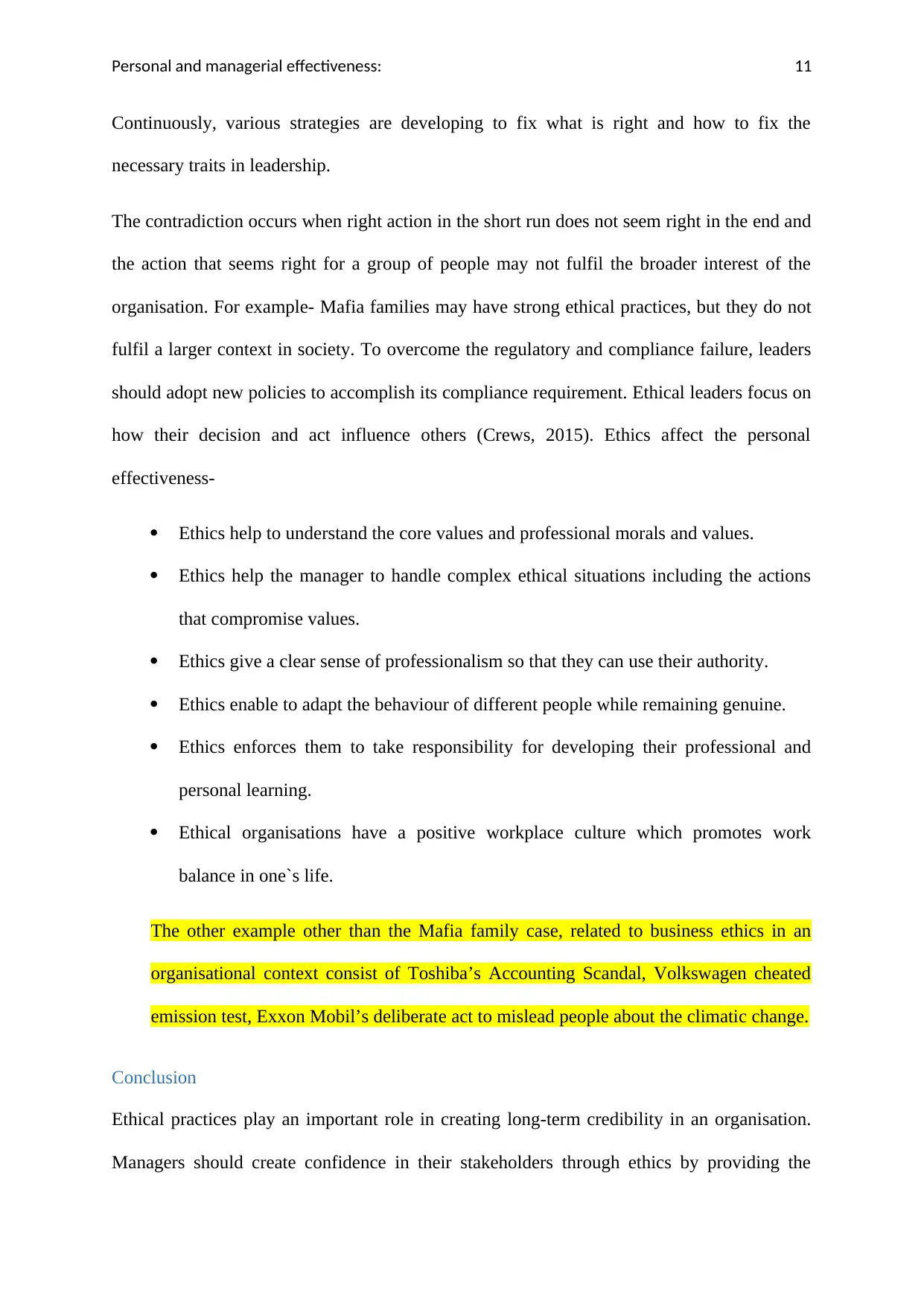
Personal and managerial effectiveness: 11
Continuously, various strategies are developing to fix what is right and how to fix the
necessary traits in leadership.
The contradiction occurs when right action in the short run does not seem right in the end and
the action that seems right for a group of people may not fulfil the broader interest of the
organisation. For example- Mafia families may have strong ethical practices, but they do not
fulfil a larger context in society. To overcome the regulatory and compliance failure, leaders
should adopt new policies to accomplish its compliance requirement. Ethical leaders focus on
how their decision and act influence others (Crews, 2015). Ethics affect the personal
effectiveness-
Ethics help to understand the core values and professional morals and values.
Ethics help the manager to handle complex ethical situations including the actions
that compromise values.
Ethics give a clear sense of professionalism so that they can use their authority.
Ethics enable to adapt the behaviour of different people while remaining genuine.
Ethics enforces them to take responsibility for developing their professional and
personal learning.
Ethical organisations have a positive workplace culture which promotes work
balance in one`s life.
The other example other than the Mafia family case, related to business ethics in an
organisational context consist of Toshiba’s Accounting Scandal, Volkswagen cheated
emission test, Exxon Mobil’s deliberate act to mislead people about the climatic change.
Conclusion
Ethical practices play an important role in creating long-term credibility in an organisation.
Managers should create confidence in their stakeholders through ethics by providing the
Continuously, various strategies are developing to fix what is right and how to fix the
necessary traits in leadership.
The contradiction occurs when right action in the short run does not seem right in the end and
the action that seems right for a group of people may not fulfil the broader interest of the
organisation. For example- Mafia families may have strong ethical practices, but they do not
fulfil a larger context in society. To overcome the regulatory and compliance failure, leaders
should adopt new policies to accomplish its compliance requirement. Ethical leaders focus on
how their decision and act influence others (Crews, 2015). Ethics affect the personal
effectiveness-
Ethics help to understand the core values and professional morals and values.
Ethics help the manager to handle complex ethical situations including the actions
that compromise values.
Ethics give a clear sense of professionalism so that they can use their authority.
Ethics enable to adapt the behaviour of different people while remaining genuine.
Ethics enforces them to take responsibility for developing their professional and
personal learning.
Ethical organisations have a positive workplace culture which promotes work
balance in one`s life.
The other example other than the Mafia family case, related to business ethics in an
organisational context consist of Toshiba’s Accounting Scandal, Volkswagen cheated
emission test, Exxon Mobil’s deliberate act to mislead people about the climatic change.
Conclusion
Ethical practices play an important role in creating long-term credibility in an organisation.
Managers should create confidence in their stakeholders through ethics by providing the
⊘ This is a preview!⊘
Do you want full access?
Subscribe today to unlock all pages.

Trusted by 1+ million students worldwide
1 out of 19
Related Documents
Your All-in-One AI-Powered Toolkit for Academic Success.
+13062052269
info@desklib.com
Available 24*7 on WhatsApp / Email
![[object Object]](/_next/static/media/star-bottom.7253800d.svg)
Unlock your academic potential
Copyright © 2020–2025 A2Z Services. All Rights Reserved. Developed and managed by ZUCOL.




